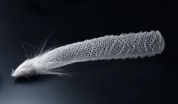It is the first study that clearly compared outcomes between surgery and an evidence-based, standardized physical therapy approach for lumbar spinal stenosis. The condition, created by a narrowing of the spinal canal that puts pressure on the nerve roots resulting in pain, numbness and weakness through the back and lower extremities, has caused decompression surgery to become the fastest-growing intervention in today's older population.
A total of 169 patients aged 50-plus already headed for decompression surgery agreed to be randomly assigned into two groups: Those who would have the procedure, and those who went through two standardized, evidence-based physical therapy sessions per week for six weeks. After both groups were re-examined at intervals of six months, one year and two years, the patient outcomes appeared to be equal. There were no detectable differences between the groups in how their pain abated and the degree to which function was restored in their backs, buttocks and legs.
"Probably the biggest point to put across to physicians, patients and practitioners is: Patients don't exhaust all of their non-surgical options before they consent to surgery. And physical therapy is one of their non-surgical options," said principal investigator Anthony Delitto, Ph.D., chair of the Department of Physical Therapy, Pitt School of Health and Rehabilitation Sciences (SHRS), as well as a member of Pitt's Health Policy Institute (HPI) and a consultant to UPMC.
Dr. Delitto, a physical therapist, and his SHRS colleagues have long puzzled over why some patients reacted well to physical therapy (PT) and others to surgery.
"The idea we had was to really test the two approaches head to head," he said. "Both groups improved, and they improved to the same degree. Now, embedded in that, there are patients who did well in surgery, and patients who failed in surgery. There are patients who did well in PT, and there are patients who failed with PT. But when we looked across the board at all of those groups, their success and failure rates were about the same."
The research project also revealed issues surrounding PT appointments and the cost of co-pay, which may prove enlightening to policymakers enmeshed in the charged atmosphere around health care, Dr. Delitto added.
Most patients didn't finish the PT regimen allowed them under Medicare and prescribed by the researchers, and one-third of the patients failed to complete even half of the regimen. Another 16 percent didn't show for a single treatment, though they had agreed to consider PT.
"One of the big things that we know held patients back from PT were co-payments," Dr. Delitto added. "Patients were on Medicare, and a lot of them were on fixed incomes. Some of those co-payments had to come out of pocket at $25, $30, $35 per visit. That adds up, and some of the patients just couldn't afford it."
This publication marks the fourth national announcement in the past two months involving Pitt research into back pain and PT treatments:
The Foundation of Physical Therapy announced in early February that SHRS and HPI are being partnered with Brown and Boston universities in a five-year, $2.5 million program to generate pilot studies as part of the Center on Health Services Training and Research, the first-ever grant to train future researchers and scientists in PT.
In mid-February, Spine published a Pitt/UPMC research project showing the early addition of manual-thrust manipulation leads to significantly greater reductions in low-back pain and improved function at four weeks. The belief of therapeutic equivalence between manual-thrust manipulation and mechanical manipulation devices isn't supported by the current evidence, wrote the team led by Michael Schneider, Ph.D., assistant professor of physical therapy, SHRS. The study was supported by the National Institutes of Health and National Center for Complementary and Alternative Medicine.
In late February, the Patient-Centered Outcomes Research Institute awarded $14 million to UPMC and Pitt through the HPI's Comparative Effectiveness Research Center to lead a clinical trial to determine how well an intervention that helps people better understand their back pain early on works toward promoting recovery and ultimately preventing chronic pain.
INFORMATION:
Dr. Delitto's fellow researchers included: Pitt's Deborah A. Josbeno, Ph.D., and Sara R. Piva, Ph.D., of SHRS, and Stephen R. Wisniewski, Ph.D., of the Graduate School of Public Health; Mark Fye, M.D., of UPMC orthopaedic surgery; Carolinas Healthcare System's Charity G. Moore, Ph.D., previously with the Pitt Department of Medicine; the University of Utah's Julie M. Fritz, Ph.D.; and the University of Pennsylvania's William C. Welch, M.D.
The project was funded by grant AR-NS45622 from the National Institutes of Health and National Institute of Arthritis and Musculoskeletal and Skin Diseases.
About the University of Pittsburgh School of Health and Rehabilitation Sciences
The University of Pittsburgh School of Health and Rehabilitation Sciences (SHRS), established in 1969, is dedicated to improving lives through academic research, technology design and rigorous training to educate the next generation of health professionals. Pursuing the goal of increasing individuals' quality of life, SHRS's various disciplines at the undergraduate and/or graduate level include: athletic training and sports medicine; audiology; dietetics and nutrition; emergency medicine; health information management; occupational therapy; physical therapy; physician assistant studies; prosthetics and orthotics; rehabilitation counseling; rehabilitation science and technology; speech language pathology; and wellness and human performance. Several of these programs rank in the Top 10 nationally. SHRS receives substantial federal funding from the Department of Defense, the Department of Veterans Affairs, the National Institutes of Health, the National Science Foundation, and the U.S. Department of Education's National Institute on Disability and Rehabilitation Research. For more information, visit http://www.shrs.pitt.edu.
http://www.upmc.com/media
Contact: Chuck Finder
Phone: 412-996-5852
E-mail: FinderCE@upmc.edu
Contact: Allison Hydzik
Phone: 412-647-9975
E-mail: HydzikAM@upmc.edu


